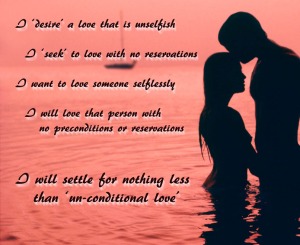 How many times have you ever heard someone say that they want a love that is unconditional? That love itself is selfless? Has no strings attached? No preconditions? I say hogwash!
How many times have you ever heard someone say that they want a love that is unconditional? That love itself is selfless? Has no strings attached? No preconditions? I say hogwash!
First off, most people that tell you this are generally people who are telling you what they ‘desire’ in a loving partner. The same people will tell you that love itself is a form of desire. Yet ‘desire’ is a form of want and want a matter of selfishness.
When someone is describing the ‘kind of love’ they desire (want) they are essentially telling you what their selfish desires are. Thus it is a bit odd when their ‘selfish’ desire is to find someone ‘selfless’. Furthermore, when they describe such a partner, it is generally implied that they have the full intention of offering the same kind of ‘un-conditional’ love in return.
Emotions
Love is of course an emotion. I was a big fan of Leo Buscaglia growing up for a number of reasons. He used to host various television shows and series on the topic of love as well as published a number of books on the subject which I read. Buscaglia described love as a ‘learned’ emotion and discouraged people from using terms such as ‘falling in’ and ‘out’ of love. In fact, he often went on to describe most if not all emotions as being ‘learned behaviors’ and I share this way of thinking.
Consider this. Our minds are rather complex mechanisms that process various stimuli and information on a number of different levels. As we go through our lives our minds create concepts to allow us to sort through the various individual and combined sensory data that our various sensory organs collect for us. For more complex combinations of multiple concepts, our minds will create an amalgam as a new concept. For example when we see a fist sized white leather ball with red stitching we think ‘baseball‘ rather than ‘fist sized white leather ball with red stitching‘.
In our early years we are taught many concepts before we can attach words to those concepts and many of these concepts are the fundamental building blocks on which the rest of our lives will act out. Various schools of psychology place a great deal of emphasis on this early development as key factors in the formation of our personalities and traits. Many of our concepts for emotions are formed at this time in the manner of the way a foundation is formed under a house, and we build upon those concepts over our lives. But how often do we stop to look at what that foundation is actually made of?
Emotions themselves are learned behaviors and responses, often quite complex combinations of multiple multiple sensory data that relates to either past experiences (concept formation) or to notions we have formed through our process of learning (fantasy scenarios). If you are told over and over and over again that Love is a magical feeling and is some kind of mystical state of bliss, if you hear or see many stories told in books and movies about fantasy love scenarios that make you feel good (remind you of past experiences or fantasies) you will incorporate those into your fuzzy-wuzzy feel good conceptualization of ‘love’.
Then when you meet someone who’s behaviors and interactions inspires enough of those many many combined concepts that helped you build your notion of love combined with your own excitement, or apprehension, nervousness, shyness, sexual arousal or other factors – woah, it feels like those concepts your brain pieced together over the years! This must be love!!!
You so want love to be ‘magical’, like you have been told over and over and over again, that you don’t stop to realize you have been hyperventilating and your adrenaline is spiking as you are trying to work up the nerve to ask that cute girl for a kiss. You conform to your concept and believe it to be ‘real’ magic.
Love is a Concept
When in fact you step back and look at all the various factors of what you both believe and think are parts of what love actually ‘is’, if you are honest enough with yourself and thorough enough in the integrity of your reduction of the concept as you know it, you will find that in fact it is based on real factors. Factors that are for the most part based on things that you consider of benefit to you, but in some cases that you were either convinced were something they aren’t or that may even be irrational in nature.
So if love is just another amalgam of multiple concepts, then you can not only rationally approach the concept but you can strive to both control it and seek to maximize it. As an ethical egoist, my suggestion of course is to optimize it rationally to your maximum benefit.
So is Love really Un-Conditional?

As I described above, most people that describe love as unconditional ‘seek’ out that form of love. i.e. they desire it. They place as a condition, the pre-requisite that the person they seek shares their (flawed) view on what love is. And upon doing so, they do so by way of selfish reasoning! The sad part is, that means they are half way there – but they never quite make it the rest of the way.
The truth is that none of us would really ‘want’ a ‘selfless’ love or for someone to love us ‘unconditionally’. For someone to do so absolutely without condition it would mean they gain no individual benefit from doing what is considered ‘loving behavior’ whatsoever. Just stop and think what this really means:
- They are not with you because they ‘want’ to be with you, but out of a sense of duty to their concept of what ‘love’ is.
- They don’t do things for you because they desire you to be happy, but because they feel obliged to do it.
- They cannot have any pre-conceived notions at all of what ‘they’ think is right or even what ‘you’ think is right. For you to ‘want’ is just as ‘conditional’ as for them
Does it sound a bit robotic? A tad idiotic? It’s being mutual slaves out of obligation to self-sacrifice. It makes you ponder that the ultimate ‘unconditional love’ is a suicide pact. Who wants that?
As for me, I ‘want’ a selfish lover. And I seek to be a selfish lover. When I am with someone, I desire someone that I ‘want’ to be with and take great ‘joy’ in being with them – and them with me. I selfishly crave a partner that greedily craves my company. I willfully desire to offer of myself to them in exchange for their offering of themselves to me. I want them to be happy, because it brings me joy for them to be that way. And I fully expect them to meet my pre-condition of seeing love the same way.
